






Gloucestershire’s first‘libraryof things’,a collaborativeproject betweenCharlton KingsParish Council, Vision21/Planet Cheltenhamand Gloucestershire Libraries.
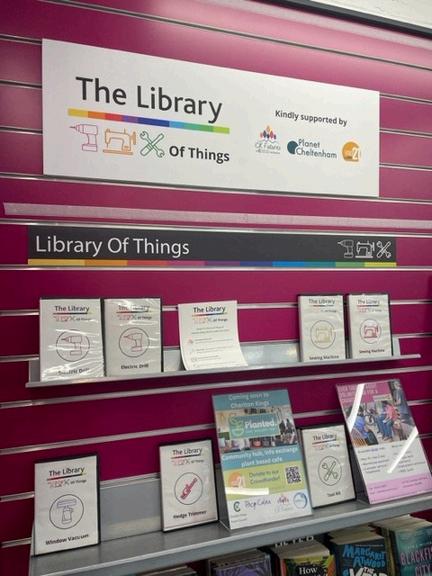
In 2021 the Planet Cheltenham project conducted a survey of Cheltenham residents to see what kinds of climate and environmental initiatives they would like to see in the town. One of the project ideas that was incredibly popular was the ‘library of things’ concept, with 58% of those surveyed saying they would like to use one
The concept is simple, to borrow rather than buy everyday items and tools. A library of ‘things’ to borrow, just like a library of books. However, when the group explored further, it seemed there were a number of barriers to setting one up including funding, space, membership software and volunteer time. Then, through collaborative work on a number of other projects, a partnership developed to explore the opportunity to create a pilot project in Charlton Kings, Cheltenham.
With start-up funding from Charlton Kings Parish Council and Gloucestershire County Council, and generous donations from local residents, library members were able to begin borrowing items for free in October 2023
This report analyses the first 12 months of the pilot project to see what the impact has been so far and possible next steps for the initiative.
Library members can use their card to borrow items from Charlton Kings library (located at Church Piece).
A spare storage room at the library is used to house the items, which are PAT tested, cleaned and repaired by Vision21 employees and volunteers. Vision21 already run a number of Repair Cafes across Gloucestershire as well as the Reclaim furniture and white goods service
Items are loaned using the library’s existing membership system.

A huge driver of climate change and biodiversity loss globally is the demand for new electrical items and appliances, and the associated natural resource use their manufacture requires Households and businesses in the UK are producing 1.45 million tonnes of electrical waste every year.*
Many of the useful items households may own (a drill, carpet cleaner, or hedge trimmer) may only get used once a year. Rather than the expense of buying these items, the space needed to store them, and the bill to repair them, what if there were community spaces where items could be borrowed as and when they are required?
The cost of essential maintenance equipment may also be a barrier for lots of people, so offering a range of DIY, gardening and repair tools makes these items and home projects more accessible and achievable.
Sharing economy projects also offer additional co-benefits of increasing community connectedness and cohesion.
*https://uk100 gn apc org/blog/2021/02/do-waste-electricals-have-key-role-play-uks-progress-towards-establishing-
In January 2023 a small group from all three organisations undertook a research trip to ZeroGuildford and Guildford Library to investigate how these existing library of things operated The group also looked online at other sharing economy platforms and examples for inspiration and advice.
Charlton Kings Parish Council and Planet Cheltenham attended events such as ‘From the Ground Up’ festival in February 2023 to gauge support for the project and find out which items people were most interested in borrowing This resulted in a crowdsourced ‘wish list’ that was promoted to the general public asking for donations of equipment that was in good condition
Any items that weren’t donated were purchased with the funding provided by the parish council and county council, however these were minimal thanks to the generosity of local donors. Funding was also used to purchase spares and consumables for the items.
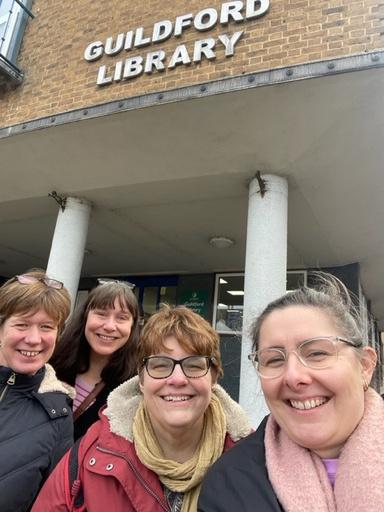

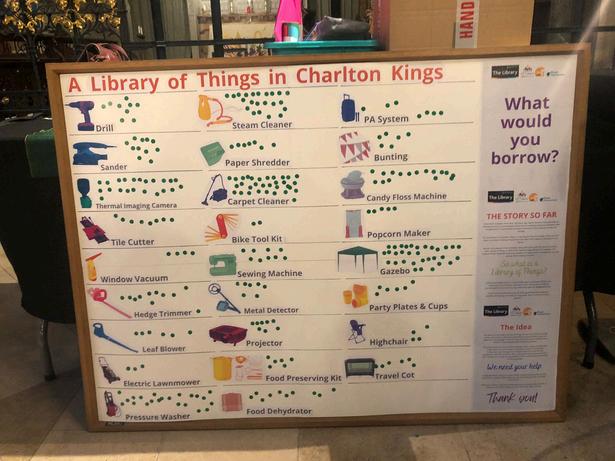
Candy Floss Maker
Bosch Cordless Hedge Cutter
Karcher Pressure Washer
Karcher Window Vac
Food Dehydrator
Gazebo 3m x 3m
Ryobi Easyedge Strimmer
Swan Portable Induction Cooker
Miscellaneous Handtools for DIY projects
Singer Sewing Machine
Wilko Cordless Power Drill
Black + Decker Corded Power Drill
Bixell Carpet Cleaner
Chocolate fountain
Yoghurt maker
Electric sander
Paper shredder
Wallpaper stripper

One of the multisolving aspects of the project was providing access to everyday tools and items to residents who might otherwise struggle to access them due to time, cost, health or other barriers
All items have been provided for free to library members, including any consumables associated with the items (eg sandpaper, carpet cleaner fluid etc) however it may be that a small charge might need to be added on to items in future to ensure the long term sustainability of the project Any charge applied would need to be minimal to avoid barriers to use.
There is also the possibility of expanding the project to include educational sessions on using the items available, for example simple DIY or sewing lessons.
Lending and sharing projects have reported a positive community impact * with residents reporting feeling more connected to the community and a greater sense of community cohesion
Anecdotally, this has already been the case in Charlton Kings, with users recommending the project to friends and neighbours
Libraries are ideally positioned to become circular economy hubs, with central locations in communities, trusted staff and the membership systems to facilitate borrowing of additional items
https://blogit.lab.fi/labfocus/en/library-ofthings-has-positive-social-and-environmentalimpacts/
The manufacture, usage and disposal of small electrical items has a significant environmental impact Whether through greenhouse gas emissions, natural resource extraction, water or air pollution, the impact of ever increasing product consumption and shorter product lifespans is creating a huge waste problem *
By reducing the need for individual ownership of items, the project cuts the associated emissions and other environmental impacts (such as water abstraction and raw material use, biodiversity loss) considerably
Items (donated or purchased) for the project are electric or rechargeable to further reduce direct emissions and air pollution There are still considerable environmental impacts from batteries, but again these are reduced through households sharing items rather than buying new
Repairing and maintaining items communally, alongside proper recycling at end of life also limits impact.
*https://www sciencedirect com/science/arti cle/abs/pii/S0921344918303689
The availability of specific data for individual items is difficult to obtain as companies have no requirement to publish this data. The Restart Project has several tools and articles covering this topic *
Analysis carried out by Cheltenham Borough Council using the methodology used by Edinburgh Tool Library looked at the material composition of items and estimated the potential carbon saving of borrowing each item instead of manufacturing a new item. These savings were estimated to be around 14776 kgCO2e or 14.7 tonnes CO2e. **
This is equivalent to around 38,198 miles driven in an average petrol car, or would require 248 tree seedlings to be grown for 10 years to sequester the same amount of carbon (EPA GHG equivalencies calculator)
The most widely used methodology for calculating carbon savings from libraries of things typically revolves around life cycle assessment (LCA) approaches, which estimate the environmental impact of products across their lifespan. However, libraries of things add a unique aspect to LCA due to their sharing model, which extends product lifespans and reduces the need for new items. Based on the longevity of products, since shared items are often maintained better than individually owned items, extending their usable life and reducing waste as they are more likely to also be properly recycled at end of use
*https://therestartproject org/consumption/hidden-impact-devices/
** Calculations and references available by request
The ICE (Inventory of Carbon and Energy) by Circular Ecology at the University of Bath.
The Climate Impact Forecast - LCA for startups and imnpact entrepreneurs.
Greenhouse Gas Reporting: Conversion factors 2020, UK Government.
402 items were borrowed over the 12 month pilot, using an average cost of around £80 per item, the project has saved residents an estimated £32,160.
The total cost of all the items in the inventory to buy new is around £3000, if every item were only borrowed once per month this would lead to almost £36,000 saved each year.
Access to the items has been provided for free to library members, with Gloucestershire County Council and Charlton Kings Parish Council funding covering the cost of buying some items to provide requested items or duplicate popular items. This funding has also covered the repair and spares for all items, alongside PAT testing, insurance and associated costs.
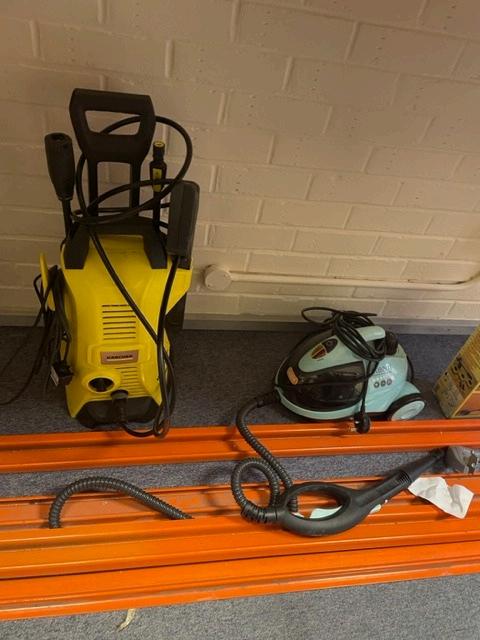
Library staff have been pivotal in the success of the project. They have collected feedback from users and received lots of positive responses to the project. Enquiries via Planet Cheltenham and Charlton Kings Parish Council suggest that new members may have signed up for library membership in order to access the service.
‘Member borrowed drill and toolbox, said ‘It’s great! I’m telling everybody about it!’
‘Mr C returned the window vacuum and was very happy with it, said it was absolutely brilliant and has finally gotten his windows clean properly after trying for years.’

‘Member borrowed hedge trimmer and has fully charged the battery on return, she said it’s a brilliant service and she’ll be using it again’
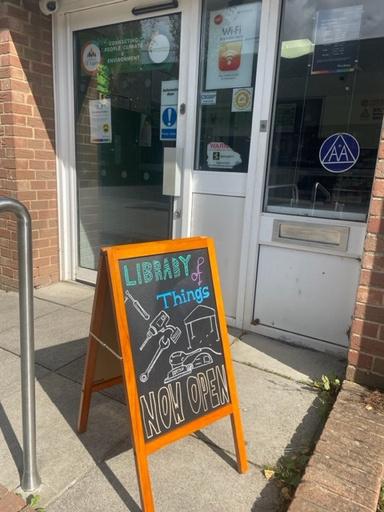
A short survey was offered to users of the service in Autumn 2024.
Those who responded rated the Library of Things 9 or 10/10 for satisfaction.
100% of users would recommend the service to others.
Respondents were asked if they would be willing to pay for the service in future, with 58% saying they would be willing to pay up to £5 and 42% willing to pay between £5 and £10.

A selection of responses below to the question what do you think of the project?

Partners in the project are currently looking at ways of expanding the library of things including:
duplicate and additional items for lending (based on a further consultation of residents) system for reservation of items
‘kids’ library of things potentially linking educational items (binoculars, microscopes etc) with specific books
learning sessions to empower residents around gardening, mending or DIY including use of the tools in the library
promoting the project continually via social media and user stories, at events and to local leaders
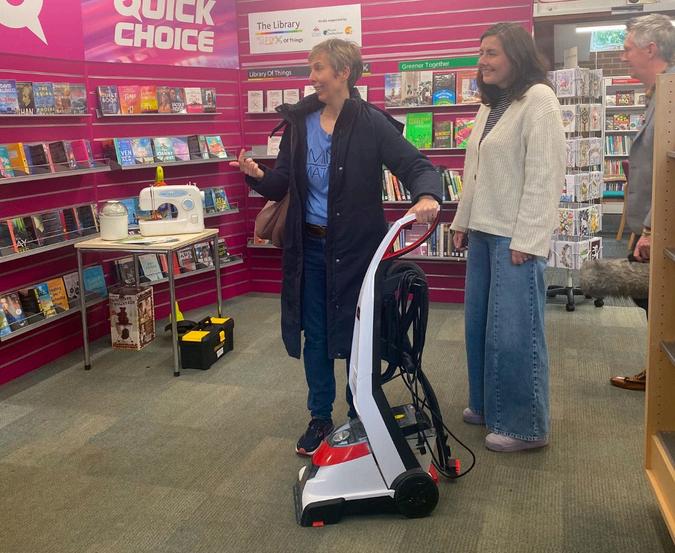
All the relevant partners are in place to expand the project beyond the initial pilot, subject to funding and finding other spaces in existing libraries.
The project idea is ‘spreadable’ (a more sustainable version of scalability!) and with sufficient community buy-in could work well in many other libraries
Please do get in touch via the contact details on the following page to enquire about donations, potential sites or requests.
https://www.charltonkingsparishcouncil.gov.uk/library-of-things https://gloslibraries.uk/gloucestershire-libraries www.planetcheltenham.org www.vision21.org.uk
